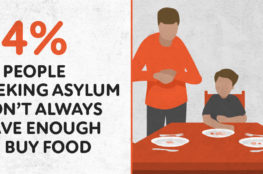Our fortnightly summary of ongoing advocacy initiatives, interesting surveys and research, government developments and useful resources. Contact us if you’d like to get this update directly into your inbox!
-
Ongoing advocacy
Asylum accommodation
The Home Office’s decision to house people seeking asylum in army barracks has remained under intense scrutiny, as campaigners and politicians continue to fight to #CloseTheBarracks.
Hundreds joined an online rally hosted by Lesbians and Gays Support the Migrants to demand the closure of Napier and Penally military barracks; while the Folkestone & Hythe District Council, where Napier Barracks is based, passed a motion by a significant majority confirming the Local Authority’s objections to the Kent site, which cross-party local councillors agreed is “not fit for purpose and should be closed”.
At a High Court hearing of a case brought by six residents of Napier barracks, the court heard that the Home Office had ignored advice from Public Health England warning against the use of dormitories at the barracks during the pandemic, with the Home Office conceding that it was arguable that the use of Napier barracks to house the group was unlawful and in breach of human rights. The same day, it was revealed the site was deemed not to meet “acceptable standards for accommodation” when it was inspected in 2013 for its suitability for housing military personnel.
Meanwhile, the Independent Chief Inspector of Borders and Immigration has carried out an in-person inspection of Napier and Penally Barracks, joined by the HM Inspectorate of Prisons including interviews and surveys of residents and staff at the facility.
On Wednesday 24 February, the Home Secretary gave evidence to the House of Commons Home Affairs Select Committee, including on asylum accommodation. While the Home Secretary argued that the barracks, in which residents were made to sleep in dormitories of up to 28 per room, are safe and abide by all relevant guidance, it was revealed during the evidence session that 178 cases of Covid-19 had been identified at Napier Barracks in January and a further 19 in February. The chair of the committee, Yvette Cooper MP, gave a strong response, saying “this looks like pretty clear evidence to me that those dormitories were not safe”. She dismissed the Home Secretary’s claim that this was a result of residents “not following the rules”, accusing her of blaming the residents of Napier barracks for a situation they had no control over. You can view clips from the evidence session on this twitter thread by Refugee Action or re-watch here.
As well as facing robust criticism for its use of military barracks, the Home Office’s network of hotels employed as contingency accommodation for people seeking asylum have come under further criticism for a catalogue of issues including allegations of sexual harassment, intimidation and claims that staff working in the hotels have been paid significantly below the minimum wage; a legal challenge to de facto 23-hour a day ‘curfews’ within some hotels; and coverage of the story of an asylum seeking woman who was evicted onto the streets from hotel accommodation without notice after taking a walk and being reported to the Home Office for absconding.
Concerns have also been raised about the abysmal state of dispersal accommodation provided by Serco for people seeking asylum in Derby.
Now, more than ever, we must #CloseTheBarracks and continue to advocate for people seeking asylum to be housed safely within our communities, in accommodation that is safe, appropriate and suitable for their needs.
You can take action through the links below:
-
Take part in Refugee Action’s write to your MP action
-
38 Degrees has also opened a petition to close the Napier barracks
-
Hastings Community of Sanctuary has a petition to close all barracks
Vaccines for All campaign
The Vaccines for All campaign launched last week, with over 300 organisations now signed up to the call on the Department of Health and Social Care to ensure everyone can access the coronavirus vaccine, regardless of immigration status, ID or proof of address. You can join the call here.
There are also some campaign resources to use including:
The Patients not Passports campaign has also drafted some tweets to re-share the call on the Department of Health and Social Care on social media. Campaigners are encouraged to share the tweets by Medact or Migrants Organise, to use one of the suggested tweets, or to compose their own using the hashtags #VaccinesForAll #HostileEnvironment #PatientsNotPassports and the tag @DHSCgovuk.
Privacy International ASPEN card campaign: Stop Spying on Asylum Seekers
Privacy International has launched a new campaign calling for the Home Office to cease surveillance on people seeking asylum via the ASPEN card. Alongside 20 other organisations, they have sent a letter to the Home Secretary asking for this practice to stop. They have also prepared the following campaigning resources:
-
A letter that can be sent and shared with supporters
-
An explainer on the ASPEN card
-
Social media cards with quotes from the testimonies, which can be downloaded here
Campaign Against Immigration Reporting
Migrants Organise and These Walls Must Fall have been working to develop a grassroots campaign against immigration reporting conditions, and will be holding an online launch event on Wednesday 3 March 18:00-20:00, which is open to everyone. You can find out more and register for the event here or find the Facebook event page here.
Migrants Organise and These Walls Must Fall also have created a dedicated google group on campaign actions and news relating to reporting conditions called NoMoreReporting. If you would like to join this group, please email [email protected].
#ProtectEveryone Bill and JCWI petition to end NRPF
In lieu of a Government response to the pandemic that ensures all members of our society are protected, Liberty has teamed up with charities, NGOs and lawyers to propose the Protect Everyone Bill, a positive alternative to the Coronavirus Act.
Included in the Protect Everyone Bill are measures relating to migrant rights to ensure their safety including the suspension of NHS charging, No Recourse to Public Funds conditions and face-to-face reporting requirements; a firewall for data-sharing between statutory bodies; and an end to detention and deportations.
In conjunction with the launch of #ProtectEveryone, JCWI has started a petition calling on the Government to urgently suspend NRPF conditions which you can sign here.
-
Research and reports
NRPF
JCWI has published a new report which highlights the risks created during the Covid-19 pandemic by the UK Government’s NRPF policy. The research finds:
-
a fifth of migrants surveyed, who were working before the onset of Covid-19, lost their job since the pandemic started; almost 75% of those were subject to NRPF, unable to access support from the government;
- 44% of those in hard-hit sectors such as cleaning and hospitality lost their jobs, and all of these were subject to NRPF;
-
Migrants subject to NRPF were 52% more likely to say that it was not possible to safely self-isolate in their home.
-
Home Office and Government developments
Operation Oak
The Home Office is planning to “accelerate” the movement of asylum seekers out of hotels and into long-term housing. People seeking asylum will start being moved out of the accommodation as part of a process called Operation Oak. There are said to be around 9,500 in hotels at present and the Home Office has said that it would move people into properties where local authorities had supported procurement.
Immigration statistics
The UK Government published immigration data for 2020 on 25 February. The statistics reveal that:
-
In 2020, just 7,546 people granted asylum in the UK, down 40% compared with the previous year
-
Across asylum, humanitarian protection, alternative forms of leave and resettlement, just 9,936 were granted protection in 2020. This figure has dropped by 52% compared with 2019, and is the lowest since 2014.
-
During this period, the number of people claiming asylum dropped by 18% down to 29,456.
-
A record number of people – 46,796, or 72% of all applicants – are now waiting more than six months for an initial decision on their asylum claim.
-
Of initial decisions that were made, just under half (46%) were grants of asylum, humanitarian protection or alternative forms of leave.
We were quoted in The Independent for the Lift The Ban campaign, highlighting the record numbers of people being forced to wait for six months or more for a decision on their asylum claim; and that current rules mean they’re effectively banned from working – even during a public health crisis.
For more information on the data, see the Refugee Council website.
-
Resources, events, jobs and training
-
Maternity Action are running a new free webinar: Access to Primary Healthcare – and other primary healthcare provisions, for migrant women who are pregnant or new mothers. This is an introductory course aimed at improving understanding of primary healthcare provisions for migrant women, regardless of their immigration status. The course is targeted at organisations working with migrant women. The webinar will take place on Thursday 18 March 2021 10-11am and you can book a place here.
-
Elmbridge Cares will host a live session on 6 March 10-11am with Ahmad Al-Rashid, one of the individuals featured in the BAFTA award winning documentary, Exodus: Our Journey. This is an opportunity to hear from Ahmad directly about his experiences and his work for refugee rights. You can sign up for the event here.
-
STAR has put together a detailed list of all upcoming university scholarships including eligibility criteria, deadlines, and how much they offer. Find the full table here.
-
Hope Not Hate has published its second briefing as part of its Response project, which seeks to better prepare the refugee and migration sector to respond to threats from the far-right threat. You can sign up here to receive the briefings.
-
TGP Cymru Refugee & Asylum Programme for Children & Young People is recruiting an Advocacy Caseworker and Participation Worker. Applications close on 5 March. You can find the Participation Worker advert here and the Advocacy Caseworker here.
-
Migrateful is recruiting for two roles: a Head of Business Development and Head of Operations. Further information on both roles can be viewed here, and the deadline for applications is 12 March.
-
RefuAid is looking to support more nurses from a refugee background into work in the NHS. They are working closely with NHS Trusts to train overseas qualified nurses with refugee status, allowing them to requalify, register with the NMC and access meaningful employment within the NHS. If you are a refugee nurse looking to return to practice in the UK, or if you know anyone who is, please share the following link: https://docs.google.com/forms/d/e/1FAIpQLScqN1INd5Whafmb2_QWi4DgEfknU7EKwiHtwFJjfzErLCxiQA/viewform
-
What we’ve been reading, watching and listening to
- In the Guardian podcast Today in Focus, ‘Matin’ tells Anushka Asthana about his stay in Napier barracks.
-
ASAP’s first podcast on asylum support explores two cases which have shaped the current landscape in regards to section 4 eligibility. Firstly, PA and MA in which Principle Judge Storey at the AST concluded that ending s4 support for those who reside in an area under Tier 3 restrictions (the highest Tier at the time), and are unwilling to leave the UK, may breach their Convention rights and those of the general public. Secondly, QBB, which is an ongoing legal challenge. The QBB court order made on 2 November 2020 is still in force, preventing the Home Office discontinuing support to those on s4 support on that date. You can listen to this podcast here.
-
Asylum Matters news
On Monday 1 March, Asylum Matters became an independent charity. We will continue to work closely with our friends at City of Sanctuary UK – which hosted Asylum Matters from inception in early 2017 – and with all of our partners, to bring about change. For more information see the statement on our website.




